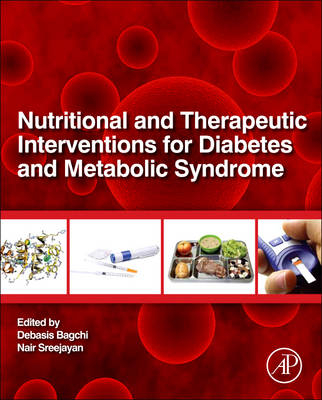
Nutritional and Therapeutic Interventions for Diabetes and Metabolic Syndrome
Academic Press Inc (Verlag)
978-0-12-385083-6 (ISBN)
- Titel erscheint in neuer Auflage
- Artikel merken
Diabetes mellitus affects approximately 20 million people in the US, or nearly 7% of the population. It is expected to increase by 70% within the next 25 years, and numerous epidemiologic studies have demonstrated that type 2 diabetes increases the risk of cardiovascular morbidity and mortality. It is estimated to cost over $92 billion in health care costs and lost productivity. The increased risk is due to the detrimental vascular effects of prolonged exposure to a hyperglycemic, oxidant-rich environment yielding associated cardiovascular risk factors: atherosclerosis, hypertension and clotting abnormalities. Hypertension and dyslipidemia in diabetic patients produces substantial decreases in cardiovascular and microvascular diseases.
Nutritional and Therapeutic Interventions for Diabetes and Metabolic Syndrome provides an overview of the current epidemic, outlines the consequences of this crisis and lays out strategies to forestall and prevent diabetes, obesity and other intricate issues of metabolic syndrome. The contributing experts from around the world give this book relevant and up-to-date global approaches to the critical consequences of metabolic syndrome and make it an important reference for those working with the treatment, evaluation or public health planning for the effects of metabolic syndrome and diabetes.
Debasis Bagchi, PhD, MACN, CNS, MAIChE, received his Ph.D. in Medicinal Chemistry in 1982. He is a Professor in the Department of Pharmacological and Pharmaceutical Sciences at the University of Houston College of Pharmacy, Houston, TX, and Chief Scientific Officer at Cepham Research Center, Piscataway, NJ, Adjunct Faculty in Texas Southern University, Houston, TX. He served as the Senior Vice President of Research & Development of InterHealth Nutraceuticals Inc, Benicia, CA, from 1998 until Feb 2011, and then as Director of Innovation and Clinical Affairs, of Iovate Health Sciences, Oakville, ON, until June 2013. Dr. Bagchi received the Master of American College of Nutrition Award in October 2010. He is the Past Chairman of International Society of Nutraceuticals and Functional Foods (ISNFF), Past President of American College of Nutrition, Clearwater, FL, and Past Chair of the Nutraceuticals and Functional Foods Division of Institute of Food Technologists (IFT), Chicago, IL. He is serving as a Distinguished Advisor on the Japanese Institute for Health Food Standards (JIHFS), Tokyo, Japan. Dr. Bagchi is a Member of the Study Section and Peer Review Committee of the National Institutes of Health (NIH), Bethesda, MD. He has published 321 papers in peer reviewed journals, 30 books, and 18 patents. Dr. Bagchi is also a Member of the Society of Toxicology, Member of the New York Academy of Sciences, Fellow of the Nutrition Research Academy, and Member of the TCE stakeholder Committee of the Wright Patterson Air Force Base, OH. He is also Associate Editor for the Journal of Functional Foods, Journal of the American College of Nutrition, and the Archives of Medical and Biomedical Research, and is also serving as Editorial Board Member of numerous peer reviewed journals, including Antioxidants & Redox Signaling, Cancer Letters, Toxicology Mechanisms and Methods, and The Original Internist, among others. Dr. Sreejayan Nair is a Professor of Pharmacology and the Associate Dean for Research in the School of Pharmacy, College of Health Sciences, University of Wyoming. He also serves as the Director of the interdisciplinary Biomedical Sciences Graduate Program in the University of Wyoming. Dr. Nair earned his bachelors, masters and PhD degree in Pharmaceutical Sciences from the College of Pharmaceutical Sciences, Manipal, India. He received his post-doctoral trainings at the Department of Medicine-II, Ludwig Maximillians University, Klinikum Grosshadern, Munich, Germany, and at the Department of Physiology, University of Tennessee Health Sciences Center, Memphis, TN. His research interests are diabetes and cardiovascular disease. He has published over 75 research papers in peer-reviewed journals and presented at various national and international conferences. His research has been funded by the American Heart Association, American Diabetes Association, and the National Institutes of Health. He has co-edited three books related to diabetes and cardiovascular disease. He is a Fellow of the American College of Nutrition.
Chapter 1: Type1 Diabetes Mellitus: An Overview
Chapter 2: An Overview on Type 2 Diabetes
Chapter 3: Pathogenesis of Type 2 Diabetes- A Comprehensive Analysis
Chapter 4: Managing the Broad Spectrum of Type 2 Diabetes
Chapter 5: Prediabetes: Prevalence, Pathophysiology and Recognition of Enhanced Risk
Chapter 6: Obesity and Type 2 Diabetes in Youths: New Challenges to Overcome
Chapter 7: Diabetes Pathophysiology- A Nutritional Perspective
Chapter 8: Diabetes pathophysiology- A Nurse’s Perspective
Chapter 9: Roles of Environmental Pollution and Pesticides in the Metabolic Syndrome and Diabetes: The Epidemiological Evidence
Chapter 10: Preventing Diabetes with Diet and Exercise
Chapter 11: The Role of Insulin Resistance in the Cardiorenal Syndrome
Chapter 12: An Overview on Diabetic Nephropathy
Chapter 13: An Overview on Diabetes and Ocular Health
Chapter 14: An Overview on Diabetic Retinopathy
Chapter 15: Role of Peripheral Neuropathy in the Development of Foot Ulceration and Impaired Wound Healing in Diabetes Mellitus
Chapter 16: An Overview on Gestational Diabetes
Chapter 17: Gene-Environment Interaction in the Pathogenesis of Type 2 Diabetes
Chapter 18: Epigenetics in the Pathophysiology of Type 2 Diabetes
Chapter 19: Targeting the metabolic syndrome and type 2 diabetes by preventing inflammation
Chapter 20: Interleukin-18 in Metabolic Syndrome and Diabetes
Chapter 21: Sleep, Hypertension and Diabetes
Chapter 22: Roles of Pancreatic Cell Functions, Liver, Skeletal Muscle and Adipose Tissues in Diabetes and Metabolic Syndrome
Chapter 23: Liver Disease: A Neglected Complication of Diabetes Mellitus
Chapter 24: Antioxidants, Healthy Diet and Diabetes
Chapter 25: Molecular Mechanisms of Diabetes Prevention by Structurally Diverse Antioxidants
Chapter 26: Cardioprotective Roles of Selenium in Diabetes
Chapter 27: Exercise and Physical Activity in the Prevention of Diabetes and Metabolic Syndrome
Chapter 28: An Overview on Nutraceuticals and Herbal Supplements for Diabetes and Metabolic Syndrome
Chapter 29: Therapeutic Effect of Fucoxanthin on Metabolic Syndrome and Type 2 Diabetes
Chapter 30: Beneficial Effects of Chromium (III) and Vanadium Supplements in Diabetes
Chapter 31: Role of n-6 and n-3 Polyunsaturated Fatty Acids in Type 2 Diabetes
Chapter 32: Effects of Supplemental Fiber in Type 2 Diabetes Mellitus
Chapter 33: The Effects of Resveratrol on Diabetes and Obesity
Chapter 34: Meal Plans for Diabetics: Caloric Intake, Calorie Counting and Glycemic Index
Chapter 35: Ayurveda and Metabolic Diseases - Whole is greater than Sum of Parts
Chapter 36: The Evolution of Glucose-Lowering Drugs for Type 2 Diabetes
Chapter 37: Anti-Diabetic Drugs For Elderly Population
Chapter 38: Diabetes Mellitus in Animals: Diagnosis and Treatment of Diabetes Mellitus in Dogs and Cats
Chapter 39: Overview of Diabetes Treatment in Animals
| Verlagsort | San Diego |
|---|---|
| Sprache | englisch |
| Maße | 191 x 235 mm |
| Gewicht | 1300 g |
| Themenwelt | Medizin / Pharmazie ► Gesundheitsfachberufe ► Diätassistenz / Ernährungsberatung |
| Medizinische Fachgebiete ► Innere Medizin ► Diabetologie | |
| ISBN-10 | 0-12-385083-5 / 0123850835 |
| ISBN-13 | 978-0-12-385083-6 / 9780123850836 |
| Zustand | Neuware |
| Haben Sie eine Frage zum Produkt? |
aus dem Bereich



